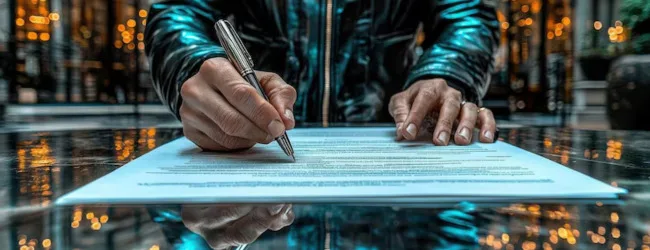Table of contents
- Why is a Business License Important?
- Types of Business Licenses in India
- Eligibility Criteria for Obtaining a Business License
- How to Obtain a Business License in India: A Step-by-Step Guide
- Step 1 : Identify the Required Licenses
- Step 2 : Gather Necessary Documents (Meticulous Preparation)
- Step 3 : Fill Out the Application Form (Accuracy is Key)
- Step 4 : Submit the Application
- Step 5 : Verification and Inspection (Due Diligence by Authorities)
- Step 6 : Issuance of License (Official Authorization)
- Step 7 : Renewal (Maintaining Legal Standing)
- Key Considerations for Business Licenses
- Conclusion
- Frequently Asked Questions (FAQs)
Starting a business in India is an exciting journey, filled with potential and opportunities. However, navigating the legal landscape is a crucial first step. One of the most fundamental aspects of this is obtaining the necessary business license. This article will serve as your comprehensive guide, breaking down the types of business licenses, eligibility criteria, and everything else you need to know to operate your venture legally and smoothly.
Why is a Business License Important?

Think of a business license as an official permission slip from the government that allows you to conduct your specific business activities. It’s not just a piece of paper; it carries significant weight:
- Legal Compliance: Operating without the required licenses can lead to hefty fines, penalties, and even the closure of your business.
- Builds Trust and Credibility: Having the necessary licenses assures customers, suppliers, and partners that your business is legitimate and adheres to regulations.
- Access to Opportunities: Many government schemes, loans, and contracts require businesses to possess valid licenses.
- Facilitates Growth: As your business expands, having the foundational licenses in place makes it easier to obtain further permits and approvals.
It’s crucial to understand that there isn’t one single “business license” that covers all types of businesses. The specific licenses you need will depend on various factors, including:
- The nature of your business: Are you manufacturing goods, providing services, or running a restaurant?
- Your business structure: Are you a sole proprietorship, a partnership, a private limited company, or another entity?
- Your location: Regulations can vary significantly between states and even within different areas of a city.
ALSO READ – From Pasture to Plate: Common Management Practices in Dairy and Poultry Farming
Types of Business Licenses in India

The landscape of business licenses in India can seem complex, but it can be broadly categorized into the following levels:
Central Level Licenses
These are required across the country for specific types of businesses, irrespective of their location.
- Import-Export Code (IEC): If your business involves importing or exporting goods, this is mandatory. For example, a Bengaluru-based textile manufacturer looking to sell their products overseas will need an IEC.
- Food Safety and Standards Authority of India (FSSAI) License: Businesses involved in manufacturing, processing, storing, distributing, or selling food products (like restaurants, food manufacturers, and caterers) need this license. Think of popular food delivery startups in India that mandatorily display their FSSAI license details.
- Drugs and Cosmetics License: Businesses involved in the manufacturing, sale, or distribution of drugs and cosmetics require this license.
- Goods and Services Tax (GST) Registration: While not strictly a “license,” GST registration is mandatory for most businesses with an annual turnover exceeding a certain threshold (currently ₹40 lakh for goods and ₹20 lakh for services, with some exceptions). GSTIN acts as a unique identification number for tax purposes.
State Level Licenses
These are specific to the state where your business operates.
- Shop and Establishment License: This is one of the most common licenses required for most businesses operating from a physical commercial establishment, including shops, offices, and commercial establishments. The specific rules and regulations vary from state to state. For instance, the Karnataka Shops and Establishments Act has its own set of rules regarding working hours, holidays, and employee welfare.
- Trade License: Issued by the local municipal authorities, this license permits businesses to carry on specific trades or occupations within their jurisdiction. The types of trades covered and the application process vary widely between cities and towns. For example, setting up a tailoring shop in a residential area might require a specific trade license from the local corporation.
- Professional Tax Registration: Several states in India levy a professional tax on individuals engaged in certain professions or carrying on a trade or business. Businesses in these states need to obtain professional tax registration.
- State-Specific Industry Licenses: Certain industries might require specific licenses from the state government. For example, setting up a manufacturing unit might require clearances from the state’s pollution control board and industries department.
Local Level Permits and Licenses
These are issued by local municipal corporations, panchayats, or other local bodies.
- Building Permits: If you are constructing or modifying a commercial building, you will need a building permit from the local authorities.
- Signage Licenses: Displaying signs and advertisements for your business often requires permission from the local municipality.
- Health and Safety Permits: Businesses like restaurants, salons, and healthcare facilities might need specific health and safety permits from local authorities.
💡 Pro Tip: If you want to start a Business but have too many doubts, connect with a Business expert from Boss Wallah for guidance – https://bw1.in/1116
Eligibility Criteria for Obtaining a Business License

The specific eligibility criteria for obtaining a business license in India can vary significantly depending on the type of license you are seeking and the government authority issuing it (central, state, or local). However, there are several common requirements and factors that are generally considered:
1 . Business Registration and Legal Structure
Registration as a Legal Entity: In most cases, you will need to have your business formally registered under a recognized legal structure. This could be:
- Sole Proprietorship: Often requires basic registration with local authorities. The owner and the business are considered the same legal entity.
- Partnership Firm: Requires a registered partnership deed outlining the terms and conditions of the partnership.
- Limited Liability Partnership (LLP): Needs to be registered with the Ministry of Corporate Affairs (MCA).
- Private Limited Company/Public Limited Company: Requires incorporation with the MCA, involving the Memorandum of Association (MOA) and Articles of Association (AOA).
- Other Structures: Depending on the nature of your business (e.g., trusts, societies), specific registration requirements will apply.
Proof of Registration: You will typically need to provide a copy of your business registration certificate or relevant incorporation documents.
2 . Identity and Address Proof of the Applicant
- For Proprietorships: Identity and address proof of the individual proprietor (e.g., PAN card, Aadhaar card, Voter ID, Passport, Driving License).
- For Partnerships: Identity and address proof of all partners.
- For Companies/LLPs: Identity and address proof of all directors/designated partners.
- Business Address Proof: Valid proof of the business premises’ address. This can include:
- Registered sale deed (if owned).
- Valid rent agreement (if rented) with a No Objection Certificate (NOC) from the landlord.
- Utility bills (electricity bill, water bill, etc.) in the name of the business owner or the entity.
3 . Specific Business-Related Documents
- Business Plan: Some licensing authorities, especially for new or specific types of businesses, might require a detailed business plan outlining your operations, financial projections, marketing strategies, and management team.
- Financial Statements: For certain licenses or renewals, you might need to provide bank statements, income tax returns, or other financial documents to demonstrate the financial viability or compliance of your business.
- Memorandum and Articles of Association (MOA & AOA): For companies, these documents define the company’s constitution and rules.
- Partnership Deed: For partnership firms, this outlines the rights, responsibilities, and profit-sharing ratios of the partners.
- Layout Plans: For businesses like factories, restaurants, and healthcare facilities, you might need to submit detailed layout plans of your premises to ensure compliance with safety and operational standards.
- Machinery and Equipment Details: For manufacturing units or businesses using specific equipment, you might need to provide details about the machinery installed.
- List of Products and Services: Clearly outlining the goods you will manufacture/trade or the services you will provide.
4 . Compliance with Specific Regulations
- Industry-Specific Requirements: Certain industries have specific regulatory requirements that need to be met to obtain a license. For example:
- Food businesses need to comply with FSSAI regulations.
- Pharmaceutical businesses need to adhere to drug control regulations.
- Manufacturing units need to comply with environmental regulations (e.g., pollution control board clearances).
- Safety and Health Standards: Many licenses, especially for businesses dealing with the public (e.g., restaurants, hotels, hospitals), require adherence to specific safety and health standards.
- Zoning Regulations: Your business location must comply with the local zoning regulations that specify which types of commercial activities are permitted in certain areas.
5 . Professional Qualifications and Certifications (If Applicable)
- For certain professions or businesses requiring specialized knowledge (e.g., healthcare, legal services, technical consulting), the individuals involved might need to possess specific professional qualifications, certifications, or licenses.
6 . Fees and Payment
- You will need to pay the prescribed fees for the application and issuance of the business license. The fee structure varies depending on the type of license and the issuing authority.
7 . No Criminal Record (for Proprietors, Partners, Directors)
- In some cases, the licensing authority might conduct background checks, and a criminal record of the key individuals involved could potentially affect the eligibility for certain licenses.
Example: For obtaining an Import-Export Code (IEC), the primary eligibility criteria include having a Permanent Account Number (PAN) and a valid bank account. For an FSSAI license, eligibility depends on the type and scale of food business, requiring adherence to specific hygiene and safety standards and submission of relevant documents related to the premises and food products.
ALSO READ | AI-Powered Agri-Tech: Revolutionizing Indian Farming with Smart Solution
How to Obtain a Business License in India: A Step-by-Step Guide

The process of obtaining a business license in India can seem intricate, as it varies depending on the specific license you need and the issuing authority. However, breaking it down into detailed steps can make the process more manageable:
Step 1 : Identify the Required Licenses
- Self-Assessment: Carefully analyze the nature of your business activities. What products or services will you offer? Will you be involved in manufacturing, trading, or providing services? This will help you narrow down the broad categories of licenses you might need (central, state, local).
- Industry-Specific Regulations: Research if your industry has specific licensing requirements. For example, starting a pharmaceutical manufacturing unit will have a distinct set of licenses compared to opening a software development company. Look for regulations specific to your sector.
- Business Structure Impact: Your business structure (sole proprietorship, partnership, LLP, private limited company, etc.) can influence the required licenses. For instance, registering a company involves obtaining a Certificate of Incorporation, which is a foundational document often required for other licenses.
- Location Matters: Regulations and required licenses can vary significantly between states and even within different cities or districts within a state. Check the specific rules of the state and local authorities where your business will operate. Websites of state government departments (e.g., Department of Industries and Commerce), municipal corporations, and local bodies are key resources.
- Consult Professionals: If you are unsure, it’s highly recommended to consult with legal professionals (lawyers specializing in business law) or business consultants who have experience with business registration and licensing in India. They can provide tailored advice based on your specific business.
- Online Resources: Explore online portals and government websites that provide information on business licenses. For example, the IndiaFilings website and similar platforms offer guidance and services related to business registration and licensing.
Step 2 : Gather Necessary Documents (Meticulous Preparation)
Basic Documents: Common documents often required include:
- Business Registration Certificate: If your business is registered as a company or LLP.
- PAN Card: Of the business entity and the proprietors/partners/directors.
- Aadhaar Card: Of the proprietors/partners/directors.
- Address Proof of Business: Rent agreement (if rented), ownership documents (if owned), utility bills (electricity, water bill).
- Identity Proof of Proprietors/Partners/Directors: Voter ID, passport, driving license.
- Photographs: Passport-sized photographs of the relevant individuals.
Specific Documents: Depending on the license, you might need:
- Business Plan: Outlining your business operations, financial projections, and marketing strategies (often required for specific approvals or loans).
- Memorandum and Articles of Association (MOA & AOA): For companies.
- Partnership Deed: For partnership firms.
- Financial Statements: Bank statements, income tax returns (sometimes required for specific licenses or renewals).
- No Objection Certificates (NOCs): From neighbors or other relevant parties, especially for businesses that might have environmental or social impact.
- Pollution Control Board Clearances: For manufacturing units or businesses with potential environmental impact.
- Layout Plans: For factories, restaurants, and other establishments requiring specific spatial arrangements.
- Educational and Professional Qualifications: For certain professions (e.g., healthcare, legal services).
Attestation: Ensure that copies of all documents are self-attested or attested by a gazetted officer, as required by the specific licensing authority. Keep originals handy for verification.
Step 3 : Fill Out the Application Form (Accuracy is Key)
- Obtain the Form: Download the application form from the official website of the concerned authority or obtain it from their physical office.
- Read Instructions Carefully: Thoroughly read all the instructions and guidelines provided with the application form before filling it.
- Provide Accurate Information: Fill in all the details accurately and truthfully. Any incorrect information can lead to rejection or delays.
- Use Capital Letters (If Required): Some application forms require information to be filled in capital letters.
- Attach Supporting Documents: Ensure all the required supporting documents are attached to the application form as per the checklist provided.
- Pay the Prescribed Fees: Understand the fee structure and the mode of payment (online, demand draft, cash). Make sure to pay the correct fee. Keep a copy of the payment receipt for your records.
Step 4 : Submit the Application
- Online Submission: Many government departments are moving towards online portals for application submission. Check if the concerned authority has an online application facility. This can often be more convenient and faster.
- Physical Submission: If online submission is not available, visit the designated government office to submit your application in person. Ensure you get an acknowledgement receipt with a date stamp for your records.
- Track Your Application: If an online portal is used, you will usually have a tracking ID to monitor the progress of your application. For physical submissions, inquire about the process for tracking the status.
Step 5 : Verification and Inspection (Due Diligence by Authorities)
- Document Verification: The licensing authority will carefully review all the documents you have submitted to ensure they meet the requirements.
- Physical Inspection: For certain types of businesses (e.g., restaurants, factories, healthcare facilities), the authorities may conduct a physical inspection of your business premises to verify compliance with safety standards, infrastructure requirements, and other regulations. Cooperate fully during any inspections.
- Addressing Queries: Be prepared to respond to any queries or clarifications sought by the licensing authority during the verification process. Promptly provide any additional information or documents they may require.
Step 6 : Issuance of License (Official Authorization)
- Mode of Issuance: If your application is approved, the license will be issued. This could be in physical format or digitally through an online portal.
- Review the License: Carefully review all the details mentioned in the license to ensure there are no errors (business name, address, validity period, conditions, etc.). If you find any discrepancies, immediately bring them to the notice of the issuing authority for correction.
- Display the License: Many licenses are required to be prominently displayed at your business premises where they are easily visible to customers and inspecting officials.
Step 7 : Renewal (Maintaining Legal Standing)
- Track Expiry Dates: Keep a close track of the expiry dates of all your business licenses. Set reminders well in advance to initiate the renewal process.
- Renewal Process: The renewal process usually involves submitting a renewal application along with updated documents and the renewal fee before the expiry date.
- Avoid Lapses: Failure to renew your licenses on time can lead to penalties, suspension of business operations, or the need to go through the entire application process again.
Example: To obtain an FSSAI license for a food manufacturing unit in Karnataka, you would need to:
- First, register your business (e.g., as a private limited company).
- Gather documents like address proof of the manufacturing unit, layout plan, list of food products, machinery details, etc.
- Fill out the online application form on the FSSAI website.
- Pay the applicable fees online.
- Undergo a facility inspection by FSSAI officials.
- If approved, you will receive your FSSAI license, which needs to be renewed periodically.
By following these detailed steps and being meticulous with your research and documentation, you can navigate the process of obtaining the necessary business licenses in India more effectively. Remember that patience and persistence are often key.
Key Considerations for Business Licenses
- Timeliness: Start the licensing process well in advance of commencing your business operations. Delays in obtaining licenses can lead to significant setbacks.
- Accuracy: Ensure all the information provided in your application and documents is accurate. Any discrepancies can lead to rejection or penalties.
- Fees: Be prepared to pay the prescribed fees for each license. The fee structure can vary.
- Compliance: Obtaining a license is just the first step. You need to ensure ongoing compliance with the rules and regulations associated with each license.
- Professional Help: If you find the process overwhelming, consider seeking assistance from legal professionals or business consultants who specialize in business registration and licensing.
Need Expert Guidance?
Starting a business can be challenging, but you don’t have to do it alone! At Boss Wallah, our 2,000+ business experts are ready to provide valuable insights and guidance. Whether you need help with marketing, finance, sourcing, or any other area of any business, our business experts are here to help you succeed- https://bw1.in/1116
Confused about Which Business to Start?
Want to start your own business but unsure which one to choose? Explore Boss Wallah, where you’ll find 500+ courses by successful business owners, featuring practical, step-by-step guides on starting and growing various businesses. Find your perfect business idea today – https://bw1.in/1111
Conclusion
Obtaining the necessary business license is not just a legal formality; it’s a fundamental step towards building a sustainable and credible business in India. By understanding the different types of licenses, eligibility criteria, and the application process, you can navigate this crucial aspect of entrepreneurship with greater clarity and confidence. Remember to research thoroughly, stay informed about the latest regulations, and prioritize compliance to ensure the smooth operation and growth of your venture.
Frequently Asked Questions (FAQs)
1 . What is the difference between a business license and business registration?
- Business registration establishes the legal existence and structure of your business (e.g., registering as a sole proprietorship or a private limited company). A business license, on the other hand, grants you the permission to conduct specific business activities. You generally need to have your business registered before applying for relevant licenses.
2 . How do I determine which business licenses my business needs?
- The specific licenses depend on your business type, structure, and location. Research the requirements at the central, state, and local levels. Consulting with a legal professional or a business advisor can be very helpful.
3 . Can I apply for all business licenses at once?
- No, the application process for each license is separate and handled by different authorities. You will need to identify the required licenses and apply to each relevant authority individually.
4 . What happens if I operate my business without the required licenses?
- Operating without the necessary licenses can lead to severe consequences, including fines, penalties, legal action, and even the forced closure of your business.
5 . How long does it take to obtain a business license in India?
- The processing time varies significantly depending on the type of license and the efficiency of the issuing authority. It can range from a few weeks to several months.
6 . Do business licenses need to be renewed?
- Yes, most business licenses have a specific validity period and require periodic renewal. The renewal process and frequency vary depending on the license.
7 . Where can I find information about business license requirements in my state?
- You can find information on the official websites of the relevant state government departments, such as the Department of Industries and Commerce, and the websites of local municipal corporations or panchayats.
8 . Is GST registration considered a business license?
- While GST registration provides you with a Goods and Services Tax Identification Number (GSTIN) and allows you to collect and remit GST, it’s primarily a tax registration rather than a general business operating license. However, it is a crucial requirement for most businesses in India.


